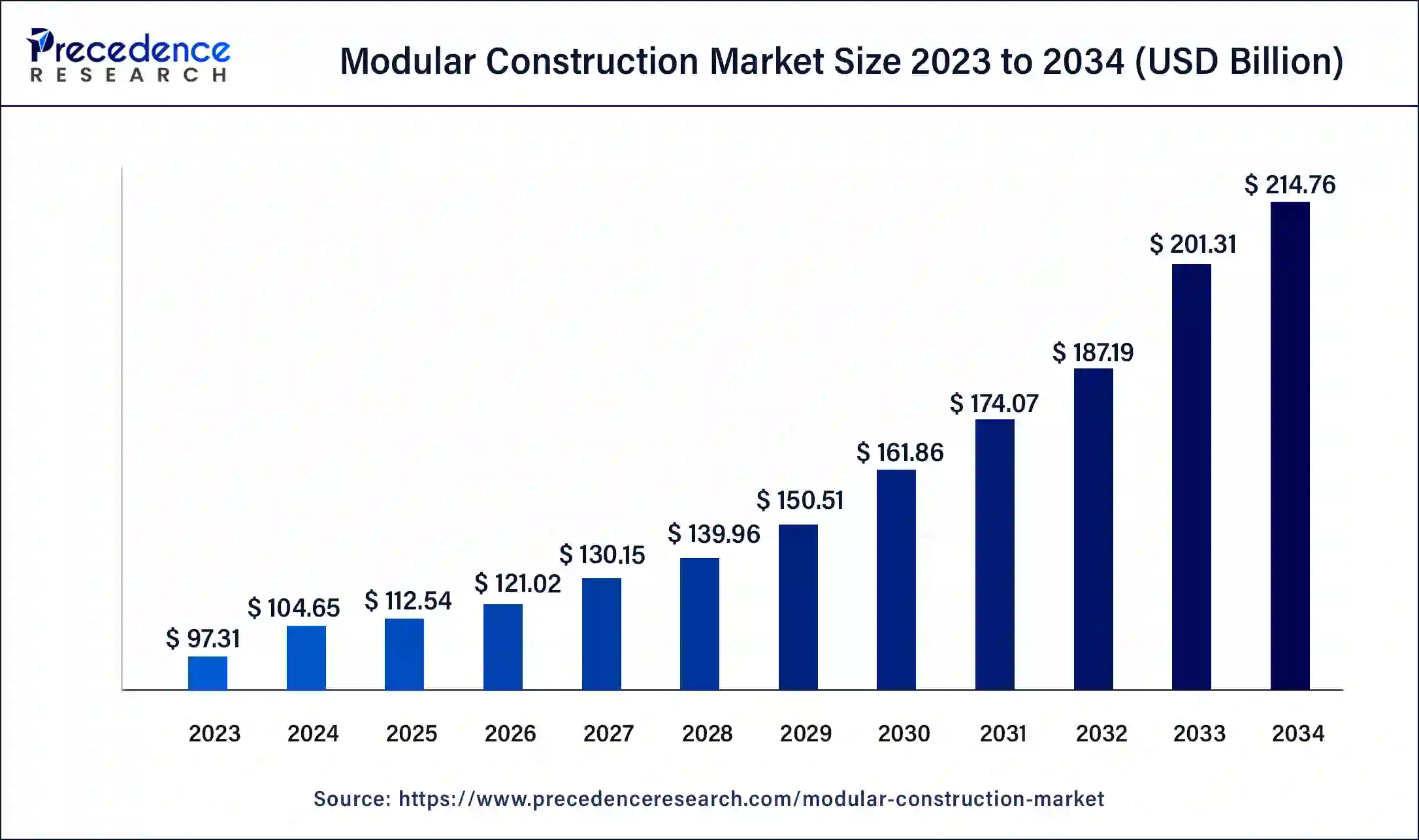The global modular construction market size reached USD 97.31 billion in 2023 and is projected to hit around USD 201.31 billion by 2033, growing at a CAGR of 7.54% from 2024 to 2033
Key Points
- Europe led the market with the biggest market share of 42% in 2023.
- Asia Pacific is predicted to grow at the fastest CAGR of 8.33% over the forecast period.
- By product, the permanent modular construction segment has contributed more than 59% in 2023.
- By product, the relocatable product segment is expected to grow at a CAGR of 7% between 2024 and 2033.
- By material, in 2023, the steel segment has held the biggest market share of 42% in 2023.
- By material, the wood material segment is anticipated to grow at a notable CAGR 7.42% over the projected period.
- By application, the residential segment has accounted more than 53% of market share in 2023.

The modular construction market is witnessing significant growth globally, driven by several factors including rapid urbanization, increased demand for affordable housing, and advancements in construction technology. Modular construction, also known as prefabrication, involves assembling building components off-site in controlled factory environments and then transporting them to the construction site for final assembly. This method offers numerous advantages such as reduced construction time, cost savings, improved quality control, and minimized environmental impact. As a result, modular construction has gained traction across residential, commercial, industrial, and institutional sectors, contributing to the overall growth of the construction industry.
Get a Sample: https://www.precedenceresearch.com/sample/4028
Growth Factors
Several factors are fueling the growth of the modular construction market. One key factor is the rising demand for cost-effective and sustainable building solutions. Modular construction offers faster project completion times and lower labor costs compared to traditional construction methods, making it an attractive option for developers and contractors. Additionally, the ability to prefabricate building components in a controlled factory environment enhances quality control and minimizes waste, contributing to sustainability goals. Furthermore, modular construction techniques allow for greater flexibility and customization, catering to diverse project requirements and design preferences.
Region Insights
The modular construction market exhibits varying dynamics across different regions. In developed economies such as North America and Europe, modular construction is gaining traction due to its ability to address labor shortages, streamline construction processes, and meet stringent building regulations. In emerging markets such as Asia-Pacific and Latin America, rapid urbanization, population growth, and infrastructure development are driving demand for modular construction solutions. Additionally, government initiatives aimed at promoting affordable housing and sustainable development further stimulate market growth in these regions. However, challenges such as lack of awareness, limited infrastructure, and regulatory barriers may hinder the adoption of modular construction in certain regions.
Modular Construction Market Scope
| Report Coverage | Details |
| Growth Rate from 2024 to 2033 | CAGR of 7.54% |
| Global Market Size in 2023 | USD 97.31 Billion |
| Global Market Size by 2033 | USD 201.31 Billion |
| Largest Market | Europe |
| Base Year | 2023 |
| Forecast Period | 2024 to 2033 |
| Segments Covered | By Product, By Material, and By Application |
| Regions Covered | North America, Europe, Asia-Pacific, Latin America, and Middle East & Africa |
Modular Construction Market Dynamics
Drivers
Several drivers are propelling the growth of the modular construction market. The need for faster project delivery times in response to urbanization and population growth is a major driver, as modular construction offers shorter construction schedules compared to traditional methods. Moreover, advancements in technology, such as Building Information Modeling (BIM) and automation, enhance the efficiency and precision of modular construction processes, driving its adoption further. Additionally, increasing awareness of the environmental benefits of modular construction, such as reduced waste and energy consumption, is prompting developers and contractors to embrace sustainable building practices.
Opportunities
The modular construction market presents numerous opportunities for growth and innovation. Expanding into new application areas such as healthcare facilities, educational institutions, and hospitality projects offers significant growth potential. Moreover, collaborations between modular construction companies and technology firms can lead to the development of innovative solutions, such as modular smart homes and energy-efficient buildings. Furthermore, partnerships with government agencies and real estate developers to address affordable housing needs and infrastructure requirements present lucrative opportunities for market expansion.
Challenges
Despite its growth prospects, the modular construction market faces several challenges that need to be addressed. One of the primary challenges is overcoming perceptions of inferior quality associated with prefabricated construction. Educating stakeholders about the benefits and capabilities of modular construction is crucial for overcoming these misconceptions. Additionally, logistical challenges such as transportation and site access constraints can impact the feasibility and cost-effectiveness of modular projects. Moreover, regulatory hurdles and zoning restrictions in some regions may impede the widespread adoption of modular construction methods.
Read Also: Micro Inverter Market Size to Rake USD 9.85 Billion by 2033
Recent Developments
- In May 2023, Guerdon, a modular construction company, revealed its acquisition of Champion Homes, another player in the modular construction industry, to expand its footprint in the residential housing market.
- In March 2023, XtreeE, a construction technology firm, disclosed its collaboration with New Living, a modular construction company, to co-create 3D-printed modular housing solutions.
- In January 2023, Boxabl, a modular construction company, declared securing $50 million in fresh funding to aid the advancement of its expandable modular homes.
- In December 2022, Balfour Beatty signed a memorandum of understanding with Holtec Britain and Hyundai Engineering and Construction (HDEC) to develop small modular nuclear reactors in the United Kingdom.
- In October 2022, Balfour Beatty announced that its 50:50 joint venture, Gammon, has been awarded an HKD 1.3 billion (USD 0.17 million) contract on behalf of Top Oasis Limited, a consortium formed by Sino Land Company Limited and CSI Properties Ltd to construct a residential development in Yau Tong, Hong Kong.
Modular Construction Market Companies
- Sekisui House Ltd.
- LAING O’ROURKE
- Red Sea International
- Skanska
- Bouygues Construction
- Premier Modular Limited
- KLEUSBERG GmbH & Co KG
- DuBox
- Wernick Group
- CIMC Modular Building Systems Holdings Co., Ltd. (CIMC-MBS)
- Riko Hiše d.o.o
- Lendlease Corporation
- Modulaire Group
- Guerdon, LLC
- Hickory Group
Segments Covered in the Report
By Product
- Relocatable
- Permanent
By Material
- Wood
- Steel
- Concrete
- Others
By Application
- Residential
- Commercial
- Industrial
- Healthcare
- Educational
By Geography
- North America
- Europe
- Asia-Pacific
- Latin America
- Middle East and Africa
Contact Us:
Mr. Alex
Sales Manager
Call: +1 9197 992 333
Email: sales@precedenceresearch.com
Web: https://www.precedenceresearch.com
Blog: https://www.expresswebwire.com/
Blog: https://www.uswebwire.com/
